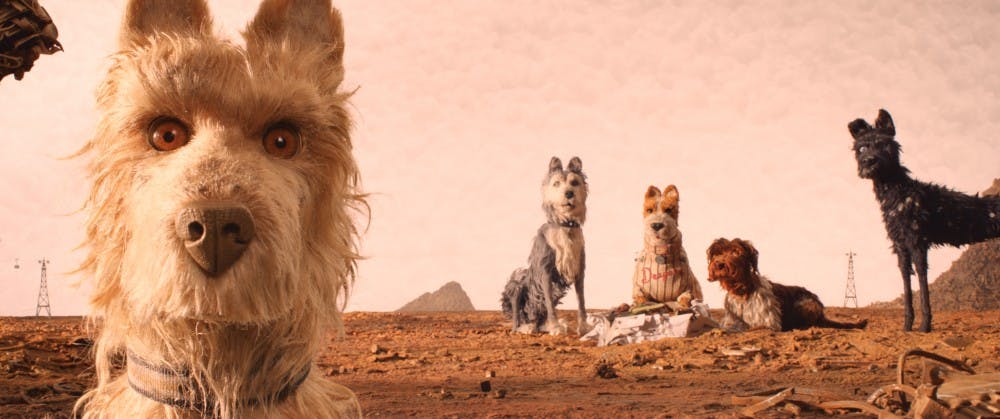The world is falling apart, but Wes Anderson remains unbothered. In fact, it seems widespread political turmoil and a lingering sense of impending doom are his secrets to success. As things have grown worse, he's only improved.
His latest charming and fun work “Isle of Dogs” is a contender for the whimsical filmmaker’s best work to date and his most socially and politically relevant, purely because it's more willing than his previous films to engage with cultural and political phenomena.
But fear not — this is no preachy political sermon, nor is it a shameless cash-in on internet culture’s current moment of doggy adoration. For better or for worse – I’d argue a resounding better — it’s a Wes Anderson movie in every drop of sardonic, deadpan humor and symmetrical shot composition. It oozes heart and charm in every wonderful moment of its run-time.
The film is set in a desolate future, which is more unbelievable for man’s betrayal of its furry companions than for the cartoonish sensibilities one expects from Anderson. “Isle of Dogs” follows a clan of cute canines on a trash island where all dogs have been exiled by the despotic Mayor Kobayashi of the city Megasaki. Everything changes for the dogs, all played by frequent A-list Anderson collaborators – look out for especially memorable supporting turns from Tilda Swinton, Jeff Goldblum and Edward Norton – when a young boy in search of his lost dog, Spots, crash-lands a plane on the island.
Visually, it’s the perfect addition to his already-rich body of work. As is true of his entire cinematic canon, it’s an immaculately rendered film, every perfectly composed frame a reminder of Anderson’s love for cinema.
But it’s also a major step forward for the filmmaker, because it feels like the first time his filmography has ever acknowledged or grappled with some sort of social or cultural milieu beyond gaggles of quirky Caucasians.
At times, it feels too Wes Anderson-y for its own good, which is odd, considering that most of his best-regarded works are his most wildly adventurous in their sensibilities. But there are notable moments in “Isle of Dogs” where the esteemed director’s zany sensibilities feel more like embellishments than vital storytelling components. His trademark deadpan humor feels especially hit-or-miss this time around, mostly because so much of it centers around the novelty of applying Anderson-isms to dogs instead of people.
The film’s faults also work to its advantage in interesting ways. Because its most tiresome elements are all the ones we’ve come to so closely associate with Anderson’s singular brand, its standouts feel fresher by comparison. To harp on the occasional triteness of its humor would be to ignore that it feels like Anderson is growing his sensibilities in exciting ways.
Perhaps much of this is derived from the fact that the ensemble cast of “Isle of Dogs” is comprised mostly of cute dogs, but I genuinely found myself invested in the characters more than just enamored of the setting and stylistic sensibilities, which is atypical of an Anderson movie. The movie comes across as refreshingly content to let moments resonate without whipping through them at breakneck speed, and though it boasts the usual tangle of narrative threads from which Anderson loves to weave his films, it feels comfortably paced and never exhausting.
That’s especially beneficial considering how aware “Isle of Dogs” is of world it exists in. The Wes Anderson of a few years ago – the one that made the woefully misguided child romance, “Moonrise Kingdom” – might have felt compelled to reduce this charming canine caper to a concise runtime in favor of making it more readily appealing, but the Wes Anderson of now – the one fueled by political strife, the one whose creativity ages like a fine Merlot – imbues his stories with more than just perfect craftsmanship and affinities for art.
It’s a far more nuanced film than just one about loving dogs. Anderson couples that endlessly touching friendship with equally powerful ideas about the world we live in, most notably the oppressiveness of falsehoods and the vitality of truth.
It's the perfect movie not only for a dog-obsessed world, but also for a country torn apart by political turmoil, lies and allegations of "fake news" to slander the truth.
As a dog-loving journalist, “Isle of Dogs” felt not only like Anderson’s love letter to dogs, but also a secret, tender love letter to me. Either way, it will remain one of the most creatively impassioned films of his career and a high point in the already rich canon of modern animation.
Never has the designation of man’s best friend felt so meaningful.



